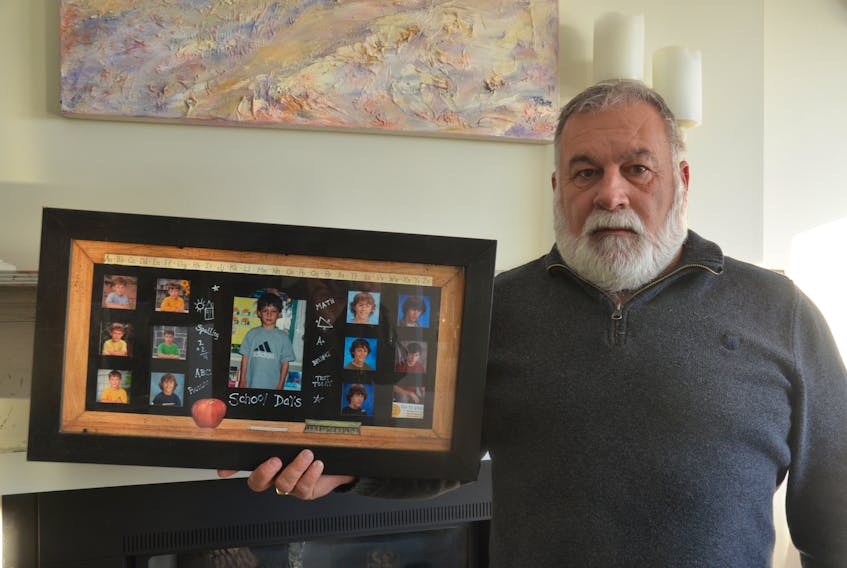BROW OF MOUNTAIN, NS - As he looks back at smiling school photos of his son, Carl Baltzer hasn’t given up hope that his boy will one day experience an epiphany and accept the help he needs.
Carl and his partner, Leslie Sweet, reached out to the Valley Journal-Advertiser to share Andrew Baltzer’s story following his recent sentencing.
On Jan. 18, Andrew was sentenced to two years and 30 days in federal custody for unlawfully producing methamphetamine in Kentville on March 10, 2017. He had been enrolled in the Court Monitored Mental Health Program (CMMHP) in Kentville at the time he pleaded guilty to this charge and to another count of mischief.
Carl has spent thousands of dollars on various drug treatment programs for his son over the years, but 30 days haven’t proven long enough to get to the root of the problem.
“I’ve dealt with this for so long and the only reason I’m good with where he is and what he’s doing now is he’s still alive,” he said.
Carl still believes the day will come that Andrew will see the light and accept help — he only hopes he’s still alive to see it.
“It’s kind of sad to think that incarceration is the only answer,” said Carl. “From what I’ve seen, there are too many young people who drugs are causing the issues that are bringing them to court and it seems the only answer is to throw them in jail.”
Looking at Andrew’s case and past record, Carl thinks the Crown prosecutor and judge felt a federal institution would be the best place for Andrew to access programming and get help.
Addicted to drugs

Sweet said Andrew is an “old soul” but he’s also a drug addict who hasn't yet reached the point to say he’s had enough. There's a silver lining to his incarceration, she says. She believes he’ll be better able to access help in a federal institution than the average person on the street trying to navigate the healthcare system.
“When he’s clean, he’s very bright, very smart, he’s very charming, talented, and he just deserves to have someone speak on his behalf,” Sweet said.
While Carl believes Andrew’s case was somewhat “unique” for the court, and while the CMMHP might work for some people, it wasn’t the answer for Andrew. By that point, he said, Andrew was “too far gone” for it to help.
Andrew's been addicted to drugs for over a decade, slowly taking away the son his father remembers.
Baltzer has hope, though. He's had phone conversations with Andrew from jail several times and he’s recognized “a hint” of his son realizing he must change his ways. He only hopes this is genuine.
According to his father, Andrew realized around age 12 that he was experiencing mental health problems. Andrew recognized and stated that he wasn’t thinking or processing the same as other kids his age.
Sweet wonders if things would have been different for Andrew if he’d had an earlier mental health intervention.
But Andrew began using marijuana in Grade 8 to help cope with his mental health issues and this increased by Grade 9. It ended up triggering episodes of psychosis.
He progressed to harder drugs, including amphetamines, cocaine, and opiates. He self-reported using enough that he would feel withdrawal symptoms when he stopped.
That's “when the problems started” with his son, Carl says, adding that Andrew would sometimes “experiment” with concoctions.
Down a difficult path
Andrew lived at home, with his father and Sweet, until November 2016. After being removed from the household, he essentially lived on the street, staying in temporary shelters at night and going to Tim Horton’s to get warm.
Sweet said a mental health caseworker helped get Andrew on income assistance and into a basement apartment in the North End Market building on Mee Road. That's where he committed his current offences.
Andrew was concocting something in a small pot on a hotplate in his apartment. He was out of money and Carl suspects that his son was trying to make a drug that he could use — but, he adds, it wasn't a “meth lab.”
Read more about the charges against Andrew Baltzer
• Kentville man charged with meth production remains in custody
• Kentville man who produced meth in apartment in North End Market sentenced to federal time
Carl says they could have gotten their lawyer to enter a not guilty plea and fought the charge since Andrew didn’t have the necessary ingredients to create meth. He questions what good this would have done, but believes Andrew should have been given a chance in the mental health court before having to enter a plea.
Although it normally isn’t a prerequisite, Sweet said Andrew had to enter the guilty plea in order for the court to be accepted into the CMMHP. She said Andrew would have been back on the street if he’d gotten off on the charge — but he needs help.
Sweet believes that Nova Scotia courts should have the ability to order and force people such as Andrew — who are addicts and have mental health problems — into rehab. That's not currently an option, though.
“Why is there not court-ordered rehab for hardened drug addicts?” Sweet said. “Jail is not the answer.”
With help from Kings West MLA and former Health Minister Leo Glavine, a spot for Andrew was arranged at Crosby House in Kentville while he was enrolled in the CMMHP. Baltzer said that two weeks into a four-week drug treatment program, a doctor told Andrew that they had succeeded in getting him long-term help out of province and that the provincial government would pay for it.
Carl says his son wanted no part of it, probably because Andrew figured he’d be out sooner going through the justice system. He snorted his prescription medication in his room — a violation of his court-ordered conditions — and Andrew was taken back into police custody and back before the court.
Read more from the Court Monitored Mental Health Program series:
• Kings North MLA’s experience leads to advocating for province-wide mental health court access
• ‘It’s a program I’m really proud to be involved with’: Kings County lawyer
'He's just got lost'
Sweet said she and Carl have given Andrew all the support they can and have tried everything they can think of to help him. She said she’ll never give up on him.
“If nothing else, I wanted people to know that Andrew is a good kid, he’s just got lost in not being diagnosed properly way back when he was 12 or 13, and it just went haywire from then,” Sweet said.
Carl doesn’t feel good about his son heading to a federal institution but “he’s come to terms with the alternative.”
“I feel right now that my son is still alive and he’s going to have some time to sit and think about it and maybe he’ll get some help,” Carl added.
Sweet says Andrew has a great smile. He makes her laugh and he’s fun to be around.
But he’s also been bounced around the system like a ping-pong ball and has overdosed twice. They look forward to being able to visit Andrew, yet they can’t help but wonder what will happen to him once he’s released.
Carl is hoping for a best-case scenario — that his son will accept the help he needs — but also wants lessons to be learned from Andrew’s case. He doesn't want to see other young people with drug and mental health issues following his son's footsteps in the future.
Sweet said she thinks everything that happened with Andrew could have been prevented, had a better system been in place.
“Mental health shouldn’t be a stigma,” Sweet said. “You talk about it.”









